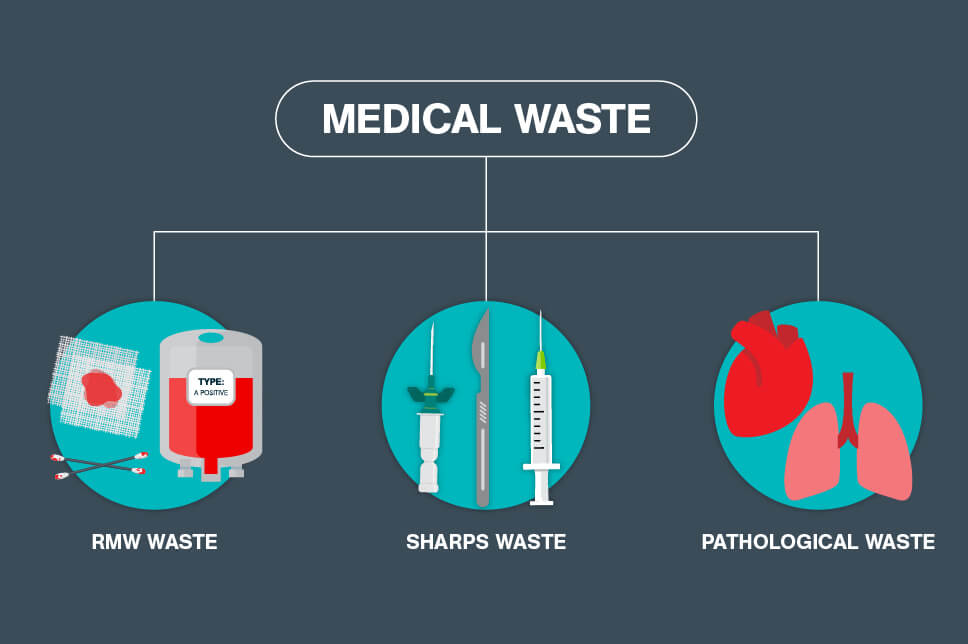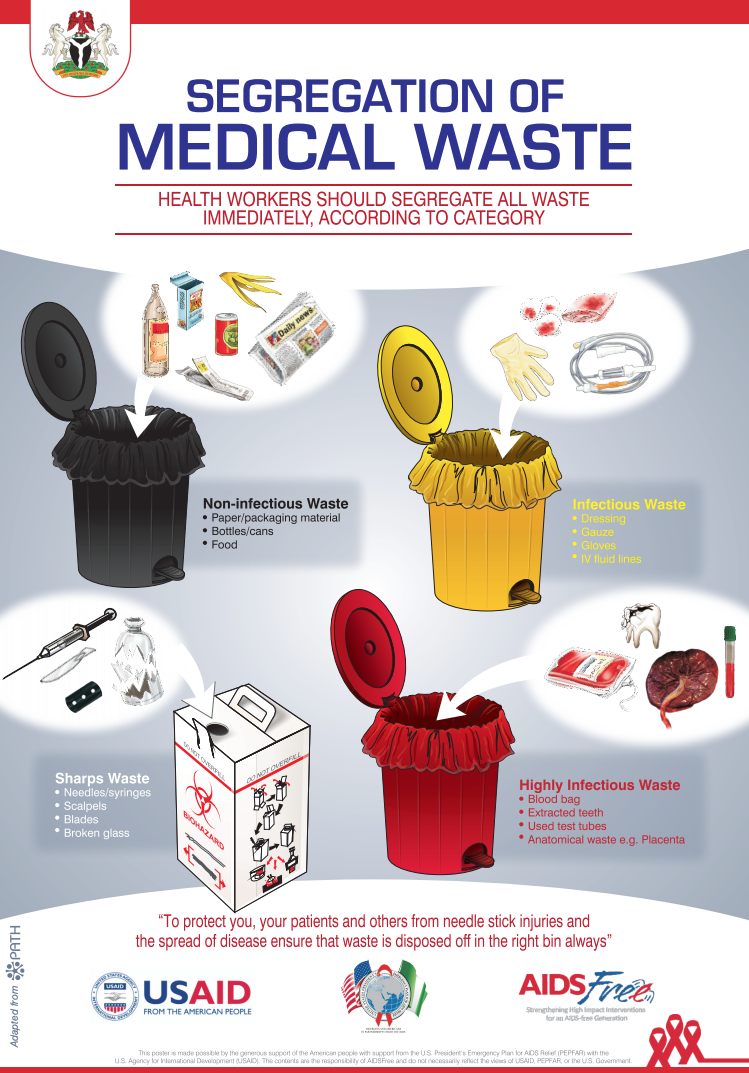Comprehensive Medical Waste Disposal Services: Making Sure a Healthy Environment
Wiki Article
The Relevance of Properly Managing Medical Waste
Appropriate management of clinical waste is of utmost importance in health care facilities. The handling, storage space, and disposal of clinical waste require strict adherence to guidelines and regulations to guarantee the safety of patients, medical care employees, and the setting. Inappropriate administration of medical waste can position major health risks, consisting of the transmission of transmittable conditions and injuries from sharp things. In addition, incorrectly thrown away clinical waste can have damaging results on the environment, infecting water sources and dirt. Medical care facilities have governing and legal commitments to correctly manage clinical waste, and failure to abide can lead to penalties and lawful consequences. By carrying out finest techniques for risk-free handling and disposal of clinical waste, medical care experts can reduce these threats and add to a more secure and healthier setting for all. Adequate education and learning and training on waste management are crucial for medical care experts to fulfill their duties in this field.Wellness Risks Connected With Improper Waste Administration
Improper management of clinical waste positions significant health and wellness threats to both healthcare workers and the public - WasteX Medical Waste Disposal. Medical waste, that includes sharps, contagious materials, pharmaceuticals, and radioactive compounds, needs appropriate handling and disposal to avoid the spread of infections, injuries, and direct exposure to harmful substances
One of the primary wellness threats linked with improper clinical waste administration is the transmission of transmittable diseases. Healthcare employees that enter into call with polluted waste may contract diseases such as HIV, liver disease, or various other bloodborne virus. Likewise, if medical waste is not appropriately dealt with, it can contaminate the environment, water resources, and even food, resulting in the spread of illness within the community.
Incorrect waste management can additionally bring about injuries, specifically from sharps such as needles, scalpels, and broken glass. Accidental needle pricks can result in the transmission of bloodborne diseases, while cuts from sharp things can cause serious wounds and infections.
Moreover, the inappropriate disposal of pharmaceutical waste can cause the contamination of water products. When expired or unused medicines are purged down the bathroom or discarded wrongly, the chemicals can leach right into water resources, influencing aquatic life and possibly entering the human food web.
Environmental Influence of Incorrectly Disposed Medical Waste
One of the substantial effects of insufficient monitoring of medical waste is its damaging impact on the setting. Incorrectly disposed clinical waste presents a severe threat to ecological communities, water bodies, and the general equilibrium of the setting. WasteX Medical Waste Disposal. The unsafe materials had in medical waste, such as transmittable representatives, pharmaceuticals, and chemicals, can pollute water, air, and dirt, leading to extensive air pollution and degradationWhen medical waste is not appropriately set apart, dealt with, and disposed of, it can locate its method right into water bodies via improper landfill methods or illegal discarding. This can cause the contamination of groundwater and surface area water, influencing water life and potentially polluting alcohol consumption water resources. The release of damaging chemicals and drugs right into the atmosphere can disrupt ecological communities and harm both pet and plant varieties.
In addition, incorrect incineration of medical waste can release harmful pollutants, including dioxins and furans, into the ambience. These toxins have been linked to various health concerns, consisting of breathing issues, reproductive conditions, and even cancer. The release of greenhouse gases during incineration additionally adds to climate modification.
To alleviate the environmental effect of incorrectly disposed clinical waste, it is critical to execute proper waste monitoring techniques. This consists of segregation of waste at the resource, proper treatment techniques, and risk-free disposal techniques. By doing so, we can decrease the air pollution and protect the atmosphere from the damaging consequences of clinical waste mismanagement.
Regulatory and lawful Responsibilities for Medical Care Facilities
In order to resolve the environmental influence of incorrectly disposed clinical waste, healthcare centers are needed to stick to governing and lawful commitments. These obligations are established to make sure the proper handling, storage, transport, and disposal of medical waste in a environmentally accountable and safe way.Among the essential legal commitments for health care centers is to get the required permits and licenses for handling medical waste. This includes acquiring a waste generator identification number and abiding by government, state, and neighborhood policies. Healthcare facilities have to also keep in-depth records of the types and quantities of medical waste produced, along with the techniques made use of for its disposal.
In addition, health care centers must apply correct segregation and packaging procedures for various kinds of clinical waste, such as sharps, infectious waste, and pharmaceutical waste - medical waste removal service. This includes using leak-proof containers, biohazard bags, and sharps containers that meet regulatory requirements
Medical care centers are additionally accountable for making certain that their team obtain ideal training on the proper handling and disposal of clinical waste. This includes training on infection control, personal protective equipment, and waste administration procedures.
Finest Practices for Safe Handling and Disposal of Medical Waste
To make certain the secure handling and disposal of medical waste, healthcare centers ought to carry out finest methods. These methods are vital to secure the health and wellness and security of both healthcare workers and the public. The appropriate management of medical waste is crucial in stopping the spread of contagious diseases and decreasing ecological contamination.One of the most effective practices for secure handling and disposal of medical waste is segregation. Health care facilities ought to divide various types of clinical waste, such as sharps, infectious products, and pharmaceutical waste, to avoid cross-contamination. Proper labeling and color coding of waste containers also play an important role in ensuring the proper partition of clinical waste.
Another crucial finest method is making use of appropriate containers for keeping and carrying medical waste. These containers should be watertight, puncture-resistant, and correctly secured to stop any kind of possible launch of dangerous products. Additionally, healthcare facilities need to establish clear protocols for the collection, storage space, and transportation of clinical waste to minimize the threat of exposure and contamination.
Additionally, medical care facilities need to educate their personnel on the proper handling and disposal of clinical waste. Normal training sessions and refresher training courses ought to be performed to keep healthcare workers upgraded on the current guidelines and standards. This will help ensure that everyone associated with the procedure is aware of the prospective dangers and is outfitted with the required understanding and abilities to handle clinical waste securely.
Education And Learning and Training for Medical Care Professionals in Waste Management
Healthcare specialists call for comprehensive education and training in waste administration to ensure the proper handling and disposal of medical waste. The administration of medical waste is a crucial a fantastic read element of medical care procedures as it straight influences the health and wellness of both healthcare workers and the general public. Proper education and training furnish health care experts with the needed expertise and skills to handle and dispose of clinical waste in a secure and eco liable fashion.Education and training programs for healthcare experts in waste management cover a variety of subjects, consisting of the category and segregation of medical waste, appropriate packaging and storage, labeling and transportation needs, and using personal safety devices. These programs likewise emphasize the importance of adherence to local, national, and global laws and guidelines controling clinical waste monitoring.
By getting comprehensive education and learning and training in waste administration, health care professionals can properly lessen the risks connected with clinical waste, such as the transmission of infectious conditions and the potential injury to the environment. WasteX Medical Waste Disposal. Well-trained experts can identify and carry out ideal practices that promote sustainability and efficient waste administration techniques within healthcare facilities.
Constant education and learning and training in waste monitoring need to be an ongoing concern for health care specialists, as waste management practices and policies may develop with time. By remaining current with the newest advancements in waste management, health care experts can guarantee that they are equipped with the understanding and skills needed to make educated choices and add to the general enhancement of waste administration methods in health care settings.

Conclusion
Finally, proper management of medical waste is important to mitigate health and wellness dangers and reduce the environmental effect. Medical care centers have regulative and legal responsibilities to guarantee safe handling and disposal of medical waste. Adhering to finest methods and offering education and training for healthcare specialists in waste management are crucial for preserving a healthy and balanced and risk-free atmosphere. By adhering to these standards, health care facilities can shield public wellness and protect the integrity of our communities.
Medical care professionals call for detailed education and training in waste administration to make certain the proper handling and disposal of medical waste - medical waste disposal service. The administration of clinical waste is a crucial element of medical care procedures as it directly influences the health and safety of both health care workers and the general public
Report this wiki page